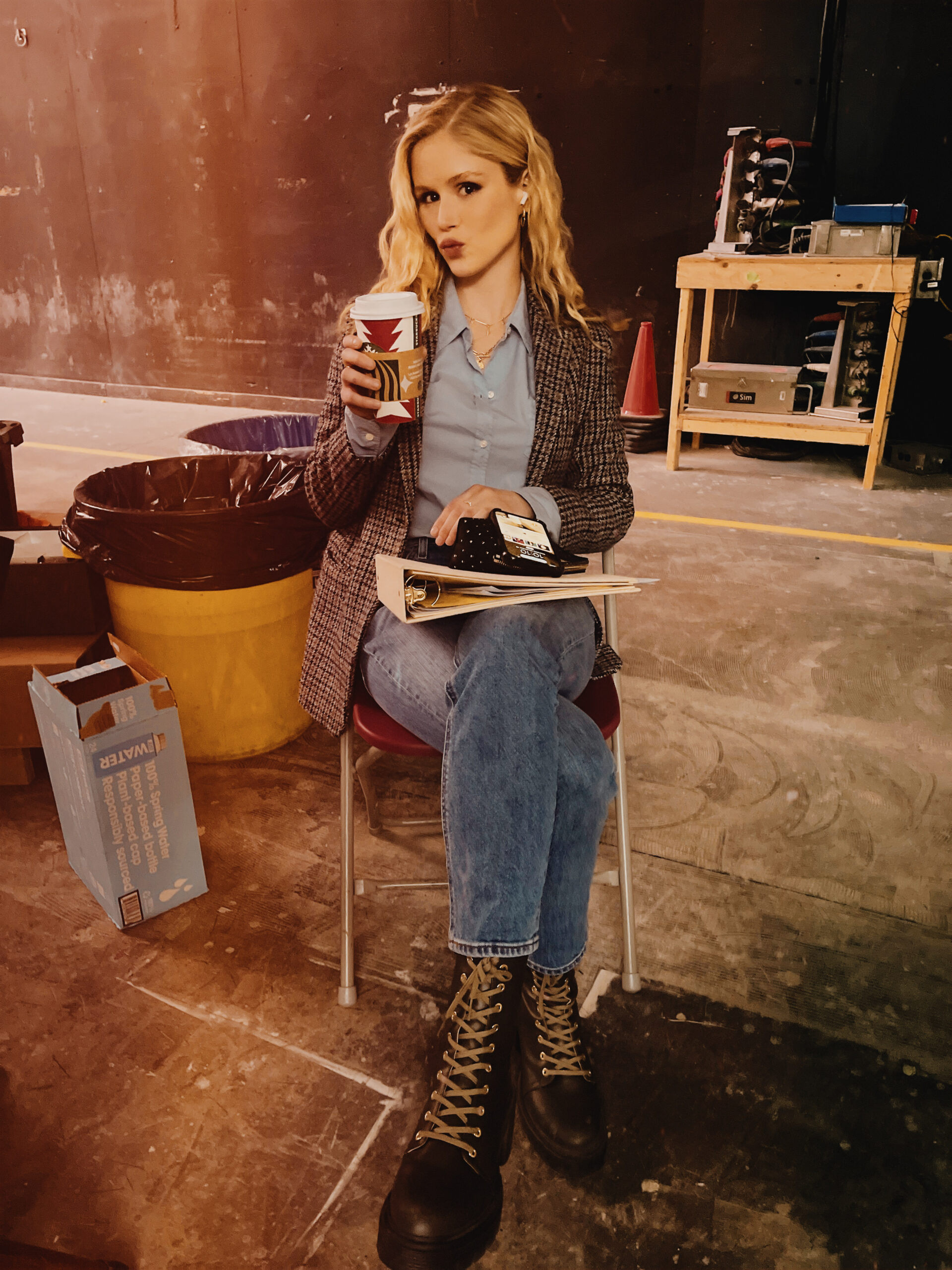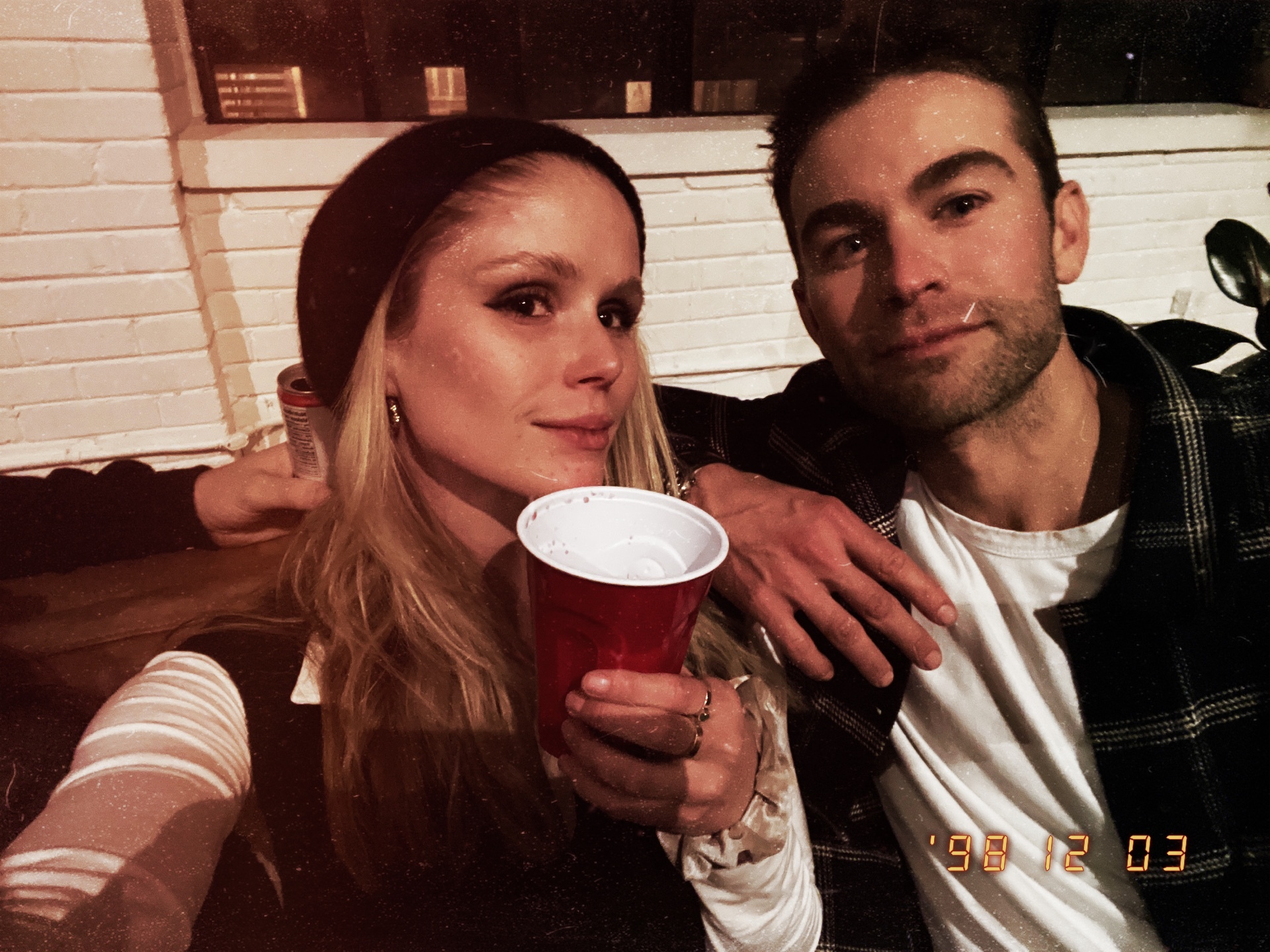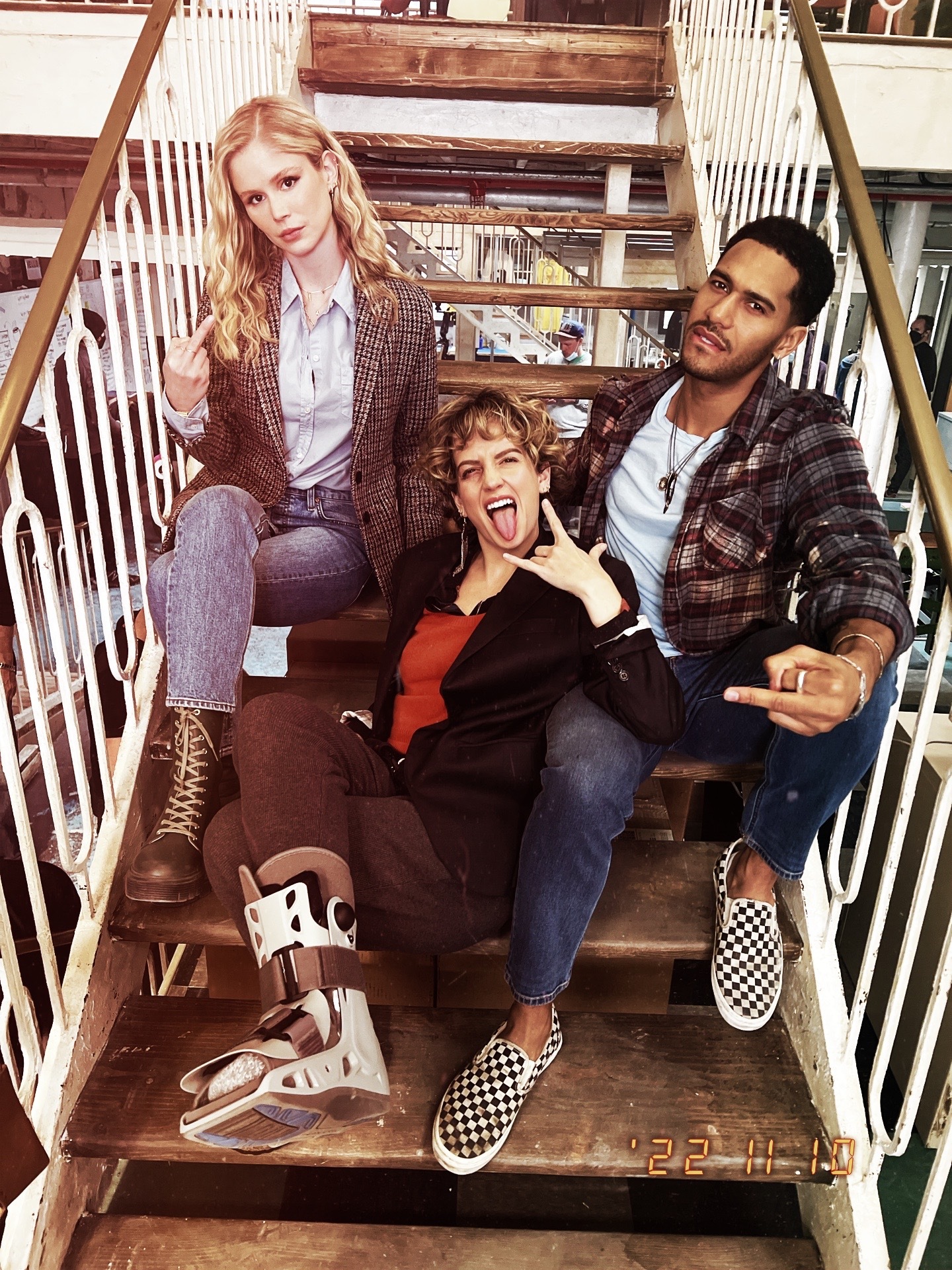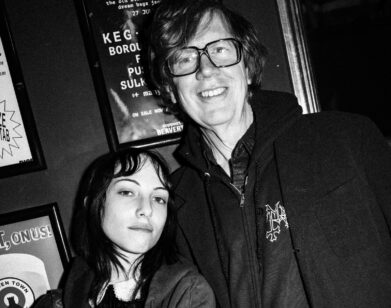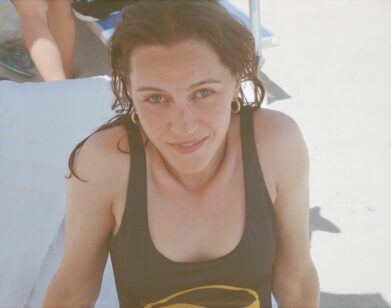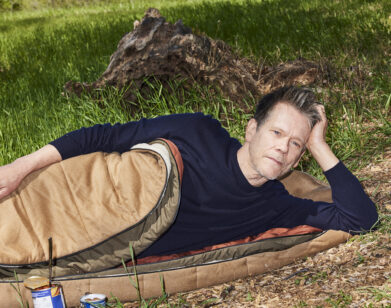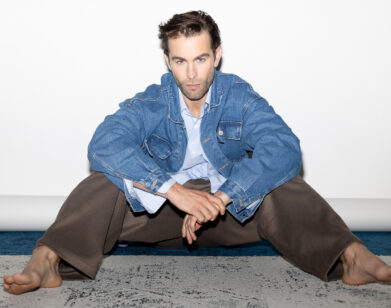IN CONVERSATION
Erin Moriarty Tells Helen Hunt Why The Boys is For the Girls
What if I told you that The Boys is for the girls? In a world where morally ambiguous bros masquerade as superheroes, Erin Moriarty saves the day—and passes the Bechdel Test— as Annie January slash Starlight, the good-girl-turned-baddie in Amazon Prime’s gleefully violent send-up of celebrity culture and comic book tropes. In the series, one of Amazon’s most popular originals, Starlight has the ‘supe’ power of harnessing electricity from the energetic pulses around her. After decades in Tinseltown, Moriarty has managed to do the same. “I know it’s the final season,” she told longtime friend and fellow thespian Helen Hunt, “but I can feel content right now and present. How often do you get to say that as an actor?” Before the show’s fifth and final season hits Prime, Moriarty talked to the original storm-chaser about savoring the moment and endowing her characters with authenticity.
———
HELEN HUNT: Well, you do look beautiful.
ERIN MORIARTY: Thank you. I was hoping it would be audio, otherwise I wouldn’t have shown up with my hair soaking wet. It’s interesting how these Zoom interviews are really amazing in terms of their ability to expand our opportunity to connect with people. But also it’s such a post-COVID era, and I feel that in every area of my life.
HUNT: What do you mean? Tell me more about that.
MORIARTY: There is something that is still in me that was conditioned over such a short but intensive span of time. There are certain things that I don’t automatically think of anymore, like going to the movies. I used to love going to matinees by myself. Have you found that to be true?
HUNT: Well, I live for going to the movies– everybody together gasping at the same thing or crying over the same thing. But I don’t go to premieres. I buy my popcorn.
MORIARTY: Because you want to support…
HUNT: And the 15-year-old in me loves it.
MORIARTY: Oh, that’s literally why I started to act. I was like, “I want to be involved in that somehow,” because it just was my favorite thing to do.
HUNT: That sentence—“I want to be involved somehow”—that was me too. My dad was directing plays, and I just wanted to be in that room.
MORIARTY: Me too. I started in theater and that was originally the drive. It was the relationship that you get with the audience that I felt as an audience member that I wanted to evoke in people as a performer on stage.
HUNT: Did you study when you were a kid?
MORIARTY: Yes, I think we’ve discussed this. We come from a similar school of acting, which is always interesting to get into, because people are very dogmatic. My mother promised me that she would allow me to get an agent when I was 18, which ended up being a little bit younger because I was insistent. She’s very grounded, not a stage mom in the reductive sense. But her thing was, “You need to approach this as anyone in any other industry. You study.” So I landed in the sort of Larry Moss technique, which we don’t need to go into in detail because it’s such a niche subject matter, but I think similar to you, the studying is part of what makes me excited for the job. And that’s why, when we worked together, I loved seeing the way you worked. It’s not about being in an echo chamber when it comes to technique. It’s about the fun of the technique.
HUNT: I’m so interested when you say you could tell my technique. What did you see that made you feel like I was doing something?
MORIARTY: Honestly, first of all, I remember you and I discussed Larry Moss explicitly. And that said everything to me, because I read his book before every job that I do.
HUNT: Oh my gosh.
MORIARTY: Literally, because I find that my memory is pretty poor. And in terms of my own approach, it’s almost like a palette cleanser if I immerse myself in a role. What I observed you do is just live these characters– and I say live because they come across as humans to a granular degree. But I could tell by the way you went about every detail of your character that it was informed and mindful, and it was apparent in the way you notated things. It was apparent in your questioning. And I loved observing you question things because that was something that I needed to learn to allow myself space to do.
HUNT: So funny, I’m not aware of those things, but as you say them, of course, they’re totally right. But it’s all motivated by not wanting to suck. I just so badly don’t want to suck. So I know I love acting and I love the artistry of it, but just a little bit more than that, the feeling of sucking is bad. All that questioning and those notes, it’s all to keep that feeling at bay.
MORIARTY: Oh god, it’s the worst. I remember watching this interview, Dustin Hoffman and Gene Hackman were in a movie together. And they both approached each other for a scene and were like, “Do you still get nervous?” I thought I would hit a point where I would lose that fear-driven approach to work, but I haven’t. It’s good because if I were numb, I wouldn’t care. But also, we all have our own process, and some people can show up to set and they earnestly feel confident in a way that I need to work at.
HUNT: Well, first of all, I just worked with Dustin Hoffman, and he does get nervous. We would look at each other, and our code was “acting class,” which meant going back to the basic things we learned. And I found that with the best actors I’ve worked with, they’re these unicorns who wander in and are mysterious and brilliant. And really, they’re mysterious and brilliant and did their time learning. I mean, I know there are people out there who are all instinct, but I am never going to be that. I gave up that aspiration. Tell me, when did you feel your artistry come through, and what went into it?
MORIARTY: Oh my gosh. So it really relates back to what we’re saying. I get anxiety leading up to work days, and the only antidote to that anxiety is to prep. There’s always a baseline amount that needs to transpire, but the more anxious I am, the more prep it requires. And in our world, the amount of work you put in doesn’t always yield the results that you want. We’ve learned that through failure and auditioning. So when you have these moments where you put in work and it correlates with the exact result that you would’ve wanted, it’s so gratifying because I didn’t have that earlier on. And so there have been these moments—
HUNT: Name one of those. I can, from acting class when I was 20.
MORIARTY: Okay, I’ll tell you. So there’s a character that I played based on a real woman who was at the receiving end of really, really brutal sexual abuse by a football team at her university. And there was one moment where I had to talk to someone about the emotional gravity of what I had been through. It involved being vilified and being dragged through the media as someone who did not go through the sexual abuse, and I was terrified. I did so much work, so much research, and I got locked up in that moment. I put so much pressure on myself. And it was a real person, and she went through this, and I couldn’t summon it.
HUNT: What did you do?
MORIARTY: I called my teacher and he said one word to me, which reminds me of what you and Dustin would say, your code word. All he had to say to me was, “Breathe.” And that just did it. For some reason, I felt safety. There were so many emotions going on, and then I was able to let it go and feel like I was this woman who went through this in a way that could do her justice. And it was that moment that I realized what my objective would be moving forward: to take characters and never allow them to lose any emotional authenticity in a singular moment. Otherwise, I fail them.
HUNT: Do you think any of that work went into The Boys? A lot of what you just said happens in your show.
MORIARTY: Yeah, absolutely. It only helped that I’d gone through that process of reading this woman’s experience, reading about it to the best of my ability. You need to be able to breathe life into these humans. And the paradoxical nature of the pilot was so human to me, which is that you’re introduced to the “good character.” She’s literally, at face value, wearing all-white. She’s the good girl, and she makes the “wrong choice” in a moment. It made me so happy to do that storyline because there was criticism for it.
HUNT: We’re talking about The Boys now. Because she didn’t scream or leave?
MORIARTY: Yeah, she gave him what she wanted…
HUNT: It’s her fault. Here we go.
MORIARTY: Exactly, and the nuances of that. One thing that I must ask—because it’s something that I think about all the time and we’re talking so much about female-centric storylines—is what it means to have status as a woman in this industry. What’s your balance between being a woman who is powerful and not afraid to take up space without having it be your identifier in a way that’s almost counterproductive? Do you find that sometimes you just want to exist in this world without having to be that?
HUNT: Well, we can skip it and not talk about it anymore. That’s one option. The only other thing I know to say is, when in doubt, use the thing. Come back to what’s bigger or use how enraging that is in the next thing I do. I use my frustration as one aspect of who I am when I feel like I go astray from myself as an artist. When you get into parts of the job that aren’t as nourishing, what brings you back to remembering why you do it? Whatever makes you go, “I’m an actor. I’m an artist. I make stuff because it may actually matter to three people out there.”
MORIARTY: It’s funny, I’ve thought about that a lot. It’s easy to answer now because I have an upcoming season of The Boys, and I feel like that brings a level of security—not in the obvious sense, but from the sense we’re talking about creatively. For me, it’s specifically those moments where things feel transactional or vapid, moments where I’ve thought, “I feel like I love this job so much, but this is a world that I don’t feel like I belong in.” It’s making sure that the bitter self-defeat doesn’t consume me. Because when I was growing up, I would see characters in shows, and they would make me feel less alone with my thoughts. My love for our job, it eclipses every other part of it. That’s really the answer. It eclipses every other part, and there are days I forget about that. I honestly do.
HUNT: Yeah, we did this movie together, The Miracle Season. A true story of this shining young woman who died way too early and a volleyball team that was counting on her. You played the unlikely freshman and I don’t know what I was, the salty coach or something. But playing real people who went through something, the good news about that is it relativizes your own nerves. “I actually need to get this right, whatever that means for these people.”
MORIARTY: It puts it into perspective.
HUNT: There was something beautiful about the experience. The women were all incredible, everybody was really good friends. I was going through a really hard time. My daughter was with me, and all of you circled around her.
MORIARTY: I remember thinking when I was really young, my first jobs, how you develop these profound connections with people and then you never see them again? Thank god they’re emotionally vulnerable roles where we’re able to find real, connective tissue, because how else would we develop friendships?
HUNT: Absolutely. What do you cherish most in other people? What qualities in other people matter?
MORIARTY: Oh my goodness. It would be the ability to look at others and think that everyone operates from a different perspective. I love that, that nuance of perspective. The best directors and writers that I’ve worked with, they try to think, “How does this character work? What would drive them to do this?” And I think that’s something I try to emulate. If someone’s able to look at another person and understand that they’re not in their shoes, you will sympathize with them to a reasonable degree. You’re not projecting all the time. That’s really it, nuance and thought and critical thinking. What would be yours? I’m curious.
HUNT: That they tell me the truth.
MORIARTY: Wow, yeah. I feel like mine is a verbose way of saying that. I want to steal yours.
HUNT: You can share mine.
MORIARTY: Authenticity is the prerequisite to any good trait, so I’m with you.
HUNT: I sort of feel like I can handle anything if I have the truth, which at this political moment, is slightly traumatizing. In every piece we do, we go into darkness and then we come out. Do you have any rituals you do before going in?
MORIARTY: Therapy.
HUNT: Right on, for sure. But that’s a lot of therapy. You go in and out of a lot of material.
MORIARTY: I know. Well, listen, it is a lot of therapy, and it’s also being in scenarios that are conducive to getting out of my own head and being with others. What happens with me is I’m very introverted and I get cyclical in my thinking. My favorite thing that I ever experienced, I went to Joshua Tree and was like, “Oh, all my issues have just shrunk.” So it’s being in nature, but also therapy. I’m definitely still learning and I’ve not nailed it. The dark days when I come home and my nervous system’s fried, that is a state that I tend to not be able to transcend to the degree that I would like to yet.
HUNT: I did one part where I had a ring on, the Irish Claddagh ring, and I would show up to work and the heart would be facing out. And then I got home and I flipped it. That’s such a small thing, but it’s as much about doing the ritual as it is about what it means.
MORIARTY: You do that for every job that you feel like has an energetic weight on you?
HUNT: I think so, yeah. Light a candle, blow it out, or turn around three times. There’s something to it, something that says I’m going in and then I’m coming out. What are you excited about as you wrap up your show? What do you want to make sure you do next year?
MORIARTY: Oh my gosh. Honestly, I think about this a lot right now, because I’m aware of something ending, which is so rare in general. I’ve been thinking more about what this role has forced me to do, which is to walk the talk. There are certain values that this role is aligned with that I share, and it’s made me have this weird ability to benefit from the character in my own personal life. But so often as actors, we’re conditioned to think about the next thing. That’s the place we live in. So I’m learning to decondition myself and be present in a way that I’ve never been before, and I think it’s only going to be magnified when we go back. I know it’s the final season. I’m excited to hopefully do things that I don’t know I’m going to be able to do. I love stunt work, I love feeling strong in that way. I love that cathartic moment where you get to punch something and you train for it and you get it right. But I can feel content right now and present. How often do you get that as an actor? I’m excited that I have the opportunity to feel these feelings, and I feel that every day, which I have never felt before. I’ve always felt this obsession with what’s next, like I’m reaching for the next rung on the ladder. I don’t need to feel that right now.
HUNT: So, being present…
MORIARTY: Being present. And it sounds like a trivial thing to be excited about, but it’s not. You know what it is? It’s a testament to my lack of ability to be present previously. That’s something I’m not taking for granted.
HUNT: That seems like a good place to end. Namaste.
MORIARTY: Namaste. I appreciate you.

